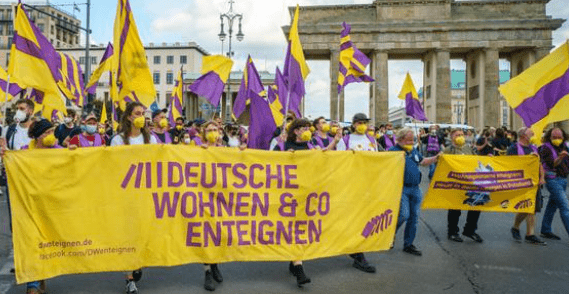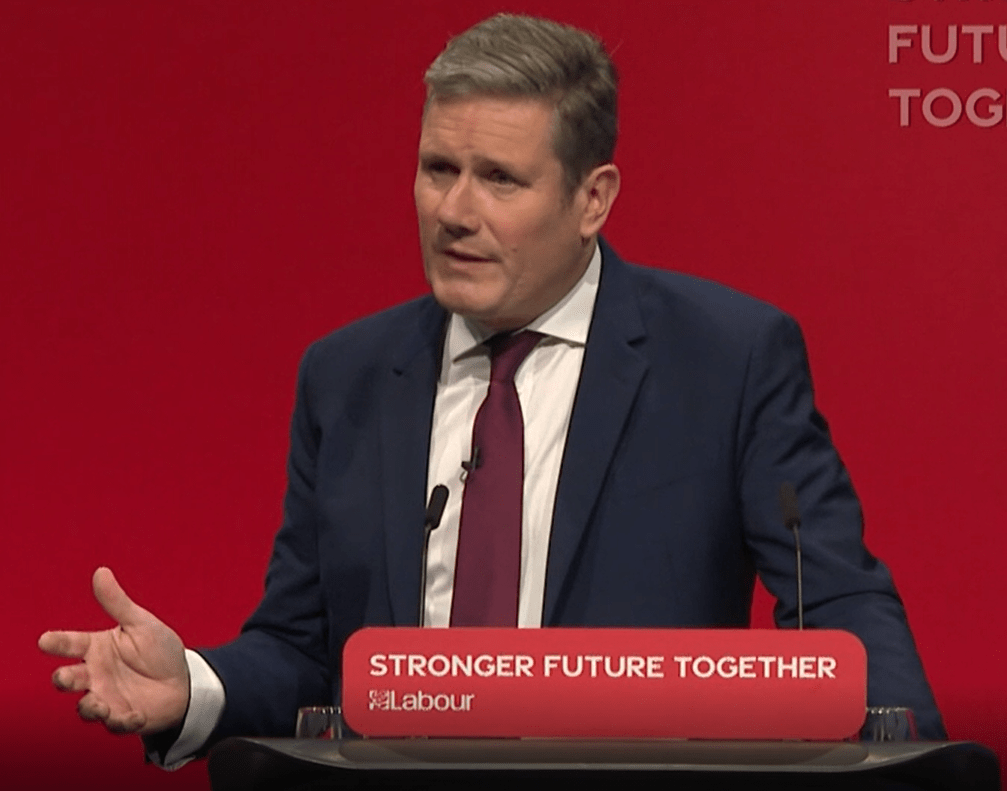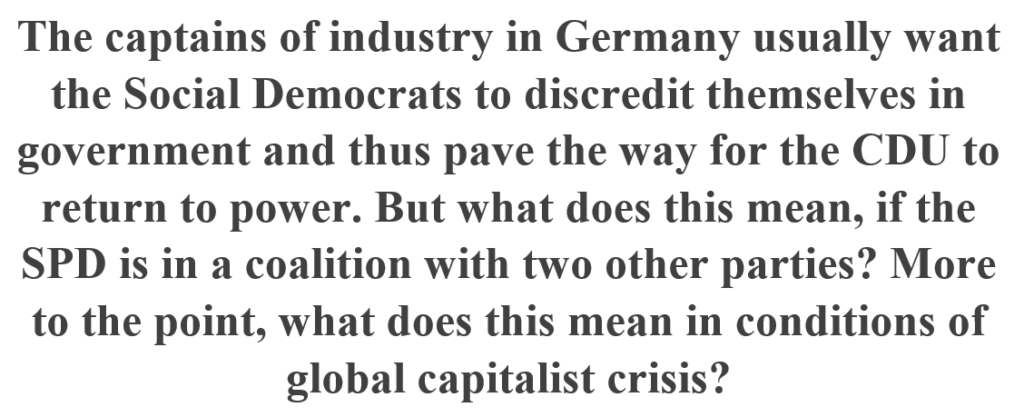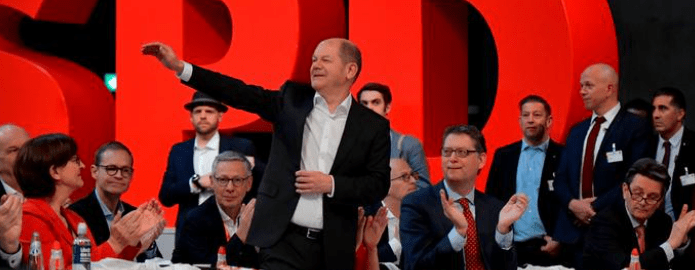By Tom Rollings, UCU University of Sheffield
On September 26 the Social Democratic Party (SPD) came first in parliamentary elections in Germany, with 25.7% of the vote, an increase of 5% from 2017. The vote for the Christian Democratic Union (CDU) fell by nearly 9% to less than 24%, the worst result in the party’s history. Olaf Scholz, the candidate of the SPD, is therefore favourite to be the next chancellor.
The SPD and CDU were in a grand coalition from 2013. But now the votes for the two main parties in Germany amount to less than 50% of the total. This is the first time that this has been the case in post-war history. Scholz is hoping to form a coalition government with the Greens and the Liberals, who won nearly 15% and 11.5% of the vote respectively. But what do these results say about the state of German society and the policies and campaigns that working people need to solve the problems that they face?
The conservatism of the SPD
The total amount of the SPD’s vote was just under 12m votes, more than it received in 2017, but not that much more than the 11.2m votes it received in 2013. Back then, on a slightly smaller overall turnout, it also received 25.7%. In other words, in comparison with eight years ago the party has not seen any significant shift in support for it. This is because as in 2013 it did not mobilise workers in support of socialist policies.
For example, Left Horizons has previously reported on a city-wide referendum in Berlin that called for the local government to look into the option of nationalising commercial landlords who own over 3,000 properties. 56% of Berliners voted in favour. This is a significant result that indicates the hunger for relevant policies that people need in response to soaring rent rises and was more than the SPD received as the leading party in Berlin’s municipal elections.

But instead of campaigning for this popular policy, the SPD leadership opposed it. Franziska Giffey, the leader of the SPD in Berlin, said such a proposal to expropriate capitalists might not be legal and “if it is not constitutional, then we cannot do it.” So rather than taking up the issues that people demand answers to, the SPD pledges allegiance to the constitution.
Instead of relying on a mass campaign of party members motivated to win an election on a socialist programme, Scholz ran a media campaign. And the mainstream media supported him precisely because he did not mobilise mass support.
In an interview with the Financial Times in June, Scholz said that the election would be less about which party had the best policies and more about “which person do we want to run the country.” In saying this of course, he had in mind himself, thanks to his role as Minister of Finance during the pandemic. After the elections, the FT endorsed his logic in stating that he had managed “to present himself as Merkel’s natural successor” (Financial Times September 29).
Minimum wage is less than in the UK
Apparently, Scholz won because Merkel did not participate in these elections. According to academic Andrea Rommele, voters used to be grateful to Merkel for reforms that the SPD initiated, but in these elections “the SPD was able to take the credit for all its achievements in government, which the chancellor would have claimed for herself if she’d been standing” (Financial Times, September 29). These achievements include the introduction of a minimum wage, in 2015.
But while every reform is welcome, no matter how small, Merkel could claim this reform as her initiative because big business accepted it. And big business accepted it because the minimum wage is only just over €9 an hour, or just under £8. This is less than it is in the UK, where delegates at the Labour Party conference called for an increase to £15.
Because Scholz did not lead a campaign based on socialist policies and the SPD came out on top, Scholz argues that his approach paid off. But if the party had campaigned on a socialist programme, it could have tapped into grassroots movements like the campaign against profiteering landlords in Berlin.
A few years ago, the leader of the SPD youth called for BMW to be nationalised. Such policies would have been popular in the context of rising inequality and growing concerns over climate change. As it is, the protest votes among the youth mainly went to the Greens.

It is possible that frustration with Scholz’s conservative agenda will develop in the working class and within the SPD. But so far, grassroots initiatives like the campaign against rent-rises in Berlin have largely developed outside the party. If, as seems likely, Scholz becomes the leader of a coalition government, he can use the excuse of not wanting to antagonise his coalition partners to avoid making any meaningful reforms in the interests of working people.
But even if he does not make any meaningful reforms, it is still possible that he could face opposition from within his coalition partners. Usually, in response to opposition that undermines its majority, a coalition government in Germany might be expected to make way for a new coalition. But it is not clear that this would be the case this time, due to the growing weakness of the CDU.
The collapse support for the CDU
Because the campaign of the SDP was so moderate, the collapse of the CDU provides a better indication of what is really happening in German society. Back in 2013 the CDU won over 18 million votes. This number fell to 15.3m in 2017 and 11.1m this time. The mass media would have us believe that if Merkel had stood again, she would have won. Because the SPD did not campaign on policies, she might have done.
But support for the CDU fell in 2017 when she was leader. Now, even despite the pro-Merkel position of Scholz, the vote for the CDU still fell. According to politicians from the CDU, this is due to the woeful campaign of Arnim Laschet, the governor of North Rhine-Westphalia and CDU candidate for the post of chancellor. But he was only elected as CDU leader earlier this year after Merkel’s chosen successor Annegret Kramp-Karrenbauer was pushed out because she was unpopular in the party.
In fact, it is not individual politicians who are unpopular, but the CDU itself. And this is the case despite the lack of serious opposition from the SPD, at a time when the working class has been largely passive. What will happen if the class struggle enters stormier waters?
When the CDU received 30-40% of the vote, it combined support from big business, the middle class and sections of the working class. But this alignment is becoming fractured. On the question of opening the borders to Syrian migrants, Merkel pandered to the wishes of big business. By contrast, her opponents whipped up opposition to migration.

It was in the context of anti-immigration hysteria that the right-wing Alternative for Deutschland (AfD) got over 12% in 2017. Now, despite the sharp fall in the CDU vote, the AfD vote also fell, to 10%. This means that if CDU voters last time switched to the AfD, this time they either did not vote or voted for the Greens or the Liberals. Now the CDU is set to immerse itself in a faction fight over who replaces Laschet. Polarisation in society might weaken the party further. Protest votes on the right could got to the Liberals or the AfD.
The party’s weakness explains why the media are putting so much pressure on the CDU to step aside and let Scholz form a coalition. Such is the deepening weakness of the CDU, that splits within a Scholz-led coalition might lead not a new CDU-led coalition, but to some sort of deal between the SPD and the CDU. But Germans are sick of coalitions between these two parties. From being very predictable, German politics is becoming very unpredictable.
The parallels with New Labour in Britain
Scholz and the right wing of the SPD have pushed the party to the right. The parallel with New Labour is clear. Scholz was a key ally of Gerhard Schroeder, who came to power at the same time as Blair and introduced counter-reforms like Blair did. For example, Schroeder attacked social insurance benefits. Like with Labour in Britain, the vote for the SPD has been in decline since the late 1990s. Just as the CDU won easily because the SPD was supporting counter-reforms, the Tories beat Gordon Brown’s Labour government in 2010.
Back then, it seemed that Labour could not get a worse result in opposition. And then under Ed Miliband, it did. This is why the Tories won a majority at the 2015 elections. But if under Corbyn the Labour Party was able to re-energise itself for the 2017 election, this did not happen in Germany.
On the contrary, in Germany from 2013 the SPD was a junior coalition partner. For senior officials like Scholz, there was no point in attacking CDU leaders like Merkel with whom he might work in future coalitions. The election in 2017 did not offer a referendum on the government. After the defeat of the SPD in 2017, Scholz stood to be party leader and lost. As a right-winger he was unpopular within the party. But the party remained inert and far removed from the lives of ordinary workers. The leadership who won in 2018 did not have anything close to Corbyn’s level of support and they were pushed out by the right-wing last year.
If in the 1990s Blair modelled New Labour on the Democrats under Bill Clinton; current Labour leader Keir Starmer may be modelling himself on Scholz. Although Starmer is not in a coalition government with the Tories, he has propped up the government more successfully than many a Tory cabinet member under Johnson. But if Starmer openly joined a grand coalition like the SPD did, this would be seen as a betrayal, and rightly so. In content, Starmer supports the government like a loyal junior coalition partner. And then he attacks the left. Just like the Tories do.
The key potential similarity that activists need to discuss, though, is whether Labour under Starmer could pull off an election victory too. Regarding Scholz the Financial Times noted that “cynics said the party’s left-wingers saw him as a convenient scapegoat if the SPD went down to a crushing electoral defeat” (September 29). To many, it was unthinkable a year ago that that Scholz could win.
Tory vote could collapse in Britain as the CDU’s has in Germany
Likewise, to many on the left in Britain it seems unlikely that an unpopular leader like Starmer could succeed where the popular Corbyn failed. But if the collapse in the CDU is anything to go by, the Tory vote could collapse even if Labour does not launch a militant offensive. According to recent surveys, queues at petrol stations brought down Johnson’s ratings. And the crisis has not even started in earnest yet.
For many Labour party members, the prospect of a Starmer victory might give rise to thoughts of what might have been if an honest successor to Corbyn had become leader and the party came to power with a programme of nationalisations. Many members have left the Labour Party in disgust at Starmer and his attacks against the left. But staying at home is not an option and neither is the idea of setting up an alternative party. Here, the example in Germany of Die Linke, (The Left), a party to the left of the SPD with parliamentary representation, is instructive.
Back in 2009 Die Linke got over 5 million votes, or nearly 12% of the vote. At a time when the SPD was in a coalition government, Die Linke had the opportunity to forge a mass socialist alternative. But in this election campaign, it tried to align its policies with those of future coalition partners and moved to the right, for example by marginalising its anti-Nato position. Consequently, its vote fell to 2.3m, or just under 5%, and now doesn’t have MPs from the party list, only constituency MPs.
Michael Roberts may be right in his blog that many Die Linke voters switched to the SPD. If so, this would only go to show that Scholz was taking nonsense about winning back Social Democratic voters who apparently voted for Merkel because they liked her. But this is not the whole picture. When the SPD vote fell in 2017, Die Linke’s vote only picked up a bit from 3.75m to 4.3m, still less than the 5.1m that it got back in 2009. Overall, the combined vote of the SPD and Die Linke fell from over 15m in 2009 and 2013 to 14.5m this time.
Rather than split off and form a new party, socialists must link the SPD and the Labour Party to the living experience of workers. Without grassroots support from workers fighting to improve their conditions, socialist policies will remain a dead-letter.

If socialist parties are not under pressure from organised workers to deliver policies that work, then parties like the SPD or the Labour Party can relatively easily win elections with the support of the mass media. It is another thing entirely when these parties fight against both the conservatives and the mass media as the Labour Party did in 2017 and 2019.
What next in Germany?
Although living standards in Germany are higher than in many other countries in Europe, workers have not seen the benefits of years of economic growth. Take Berlin, where the economy is growing but rent rises are pricing local people out of the city. Inflation is at near 4%. Wages are not keeping up, as Michael Roberts explained in his post-election blog: “German real wages fell during the Eurozone era and are now below the level of 1999, while German real GDP per capita has risen nearly 30%”.
The rise in inequality has fostered corruption and fraud. In recent years there has been a big court case involving Volkswagen known as ‘dieselgate’ after its diesel-powered cars emitted more greenhouse gases than advertised. But the SPD has failed to connect with this opposition because its leadership is also part of the status quo (other corruption cases have included colleagues of Scholz). This is why the parliamentary representation of the left, including both the SPD and Die Linke, has fallen at the same time that the conditions of working people have deteriorated.
The captains of industry in Germany usually want the Social Democrats to discredit themselves in government and thus pave the way for the CDU to return to power. But what does this mean, if the SPD is in a coalition with two other parties? More to the point, what does this mean in conditions of global capitalist crisis?
Scholz will certainly use the excuse of not wanting to antagonise his coalition partners to avoid making any meaningful reforms in the interests of working people. But because of the fundamental crisis in the world economy that Covid has accentuated, the next years will not be years of stability in Germany. Already, sections of the working class such as railway workers have engaged in strike action to wrestle back their real level of wages.
The experience of the Schroeder government will not be repeated
A few years ago, there was a strike in the logistics sector during the busy Christmas period. Workers in that sector are under intense pressure and are in an excellent position to go on strike again. But this time, such industrial action could gain an echo throughout the working class.
In short, the experience of the Schroeder government will not be repeated. It is one thing to renege on manifesto commitments at a time when the working class is largely passive. It is another thing to actively fight back against workers when they are moving into struggle. The Liberals, especially, will be keen to attack workers. Their leader, Lindner, may see an opportunity to make his party the trusted ally of German capitalism. His resistance to measures in support of people on low incomes can provoke splits not just between the coalition parties but also within the SDP parliamentary group.
If a Scholz-led coalition hits the rocks, will the captains of industry demand that the CDU lead the government? Fresh elections would be an option, but one that the main parties may avoid if they think that they will do badly. Since the CDU is losing support, it could provoke further opposition if it headed a new coalition government and introduced counter-reforms. But if the CDU in opposition props up a coalition government, it will lead to splits within the CDU.

Now, the decline in authority of the two main parties means that instead of being instruments to establish order, they could lead to further instability. In addition to the fate of individual parties, it is possible that the wider political system may become unpopular. This is not to say that a government of crisis will emerge overnight. But because it is difficult to see how the CDU or the SPD can claw back support if they continue to attack the working class, sooner or later they will have to foot the bill.
It suited Scholz to avoid class issues during the elections. But ignoring reality does not solve anything long-term. Debates about policy that did not take place during the election will surface on the picket lines and on the streets. Working conditions rather than traditional political allegiances determine the outlook of workers.
Burden of capitalist crisis falls on workers’ shoulders
Rather than having single-issue parties like the Greens on the environment and the Liberals with their opposition to increasing government debt, workers need a political voice in response to the many problems that they face. This is possible because the source of rising prices and rents, the environmental crisis, government indebtedness, corruption etc., is ultimately one and the same: production for profit.
But at the moment the SPD is not providing that voice. On the contrary, it is at the heart of a political system that is placing the burden of capitalist crisis on the shoulders of workers. Instead of the deteriorating status quo, workers need a planned nationalised economy that produces for need and not profit, with a matching socialist political system to boot. There is no other way to carry through the green revolution and make prices affordable in the short term.
If it materialises, such a socialist movement in Germany would face the same counter-argument that Corbyn faced back in the 2019 election: such reforms are fine on paper, but they would lead to an international strike of capital and ultimately economic chaos. The problem for the labour movement in Britain then was that its leadership did not concretely link the struggle for a socialist programme in Britain with the struggle of the working class internationally.
Because the Labour Party lost heavily, Scholz can say, like Starmer, that it is necessary to be ‘responsible’, rather than radical. Actually, it is necessary for the labour movement to be responsible and radical, and for this to happen, it must be both nationally and internationally.
What are the lessons for socialists in Britain?
In Britain Starmer claims that ‘victory is more important than unity’. But there is no gain for workers if parties that are socialist in name come to power and then introduce counter-reforms against the interests of workers. During the winter of discontent in 1978/9, the labour movement fought back against a Labour government. The Labour party then lost the 1979 election and Thatcher came to power.
The irony is that on September 28, i.e. coinciding with the Labour Party conference, a Tory Transport Minister nationalised London and South-Eastern Railways, because of fraud by management. Yet at the Labour party conference, Starmer reneged on Corbyn’s commitment to nationalise the energy sector. No doubt at similar SPD party events, Scholz similarly ruled out nationalisation as ‘ideological’. But nationalisation now is not ‘ideological’, it is a necessity, especially in the energy sector. And for that matter also in the transport sector and beyond.
Working people don’t need unity with the right wing at any cost, but clear policies in the interests of working people, namely the nationalisation of the energy sector, banking, the big retailers and so on, and a democratic plan to run the economy under workers’ control in Britain, Germany and internationally.




Diw Linke DO have list MPs in spite of failing to get 5%.
Any party that gets 3 constituency MPs, which Die Linke JUST did, no longer need to jump the 5% hurdle.
If i lived in Germany i would be very tempted to join Die Linke.
Thanks for clarifying this Ray, I wasn’t aware of this rule.
I would have been tempted to join die Linke in the past, by now I think most of the best activists have already left in disgust at the reformists in its leadership. When there are two left-reformist parties, the smaller one is likely to wither on the vine. There will be opposition to the SPD leadership if it leads a coalition. But I don’t see die Linke as able to become a focal point for this opposition. In the coming years such opposition might develop instead within the SPD itself